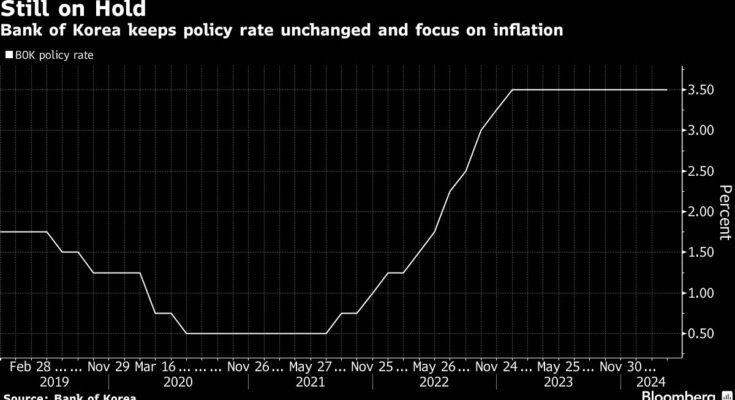(Bloomberg) — Bank of Korea Governor Rhee Chang-yong has flagged the possibility of an interest rate cut later this year if inflationary pressures ease as expected, joining global policymakers. paving the way for policy cuts.
Most Read from Bloomberg
The board believes that a rate cut in the second quarter “cannot be ruled out” if inflation slows to 2.3% by the end of this year, Rhee said at a press conference on Friday after the central bank held the rate. its 3.5% for the 10th time, a decision expected by all 23 economists surveyed by Bloomberg.
While Rhee followed his comments with a warning that cuts could be difficult if inflation remains difficult to reverse, he spoke more modestly than before about the prospect of tapering. Meanwhile, the bank changed its policy statement to remove the “long term” from its previous commitment to keep the rate steady “for a sufficiently long time.”
“The release of the policy statement can be seen as sowing the first seeds for future rate cuts,” said Cho Yong-gu, a fixed income strategist at Shinyoung Securities. The first installment may come in August now, he said.
The country’s three-year policy-oriented bond yield fell nearly six basis points to 3.4% after the BOK’s decision and Rhee’s discussion. The possibility of a rate cut combined with broader strength in the dollar weighed on the win which weakened 0.8%.
Rhee told reporters that the BOK removed the “long term” from its policy statement because it wanted to create space to indicate a possible policy change in the second half.
Rhee isn’t the only one calling for policy cuts later this year. Keeping its interest rate steady for the fifth meeting earlier this week, the European Central Bank gave the clearest signal yet that it is willing to start cutting rates if inflation cools. In America, expectations for a 2024 policy pivot remain firm even though the Federal Reserve may do so later than previously expected.
After faster-than-expected growth in the US in March, investors cut their forecasts for two Fed rate cuts this year, with the first not expected until September.
May will be a very important month for the BOK because the board will include the economic and inflation forecasts scheduled for release that month among the factors being considered as it plans its operations. next, Rhee said.
“In general the press statement was the same or less compared to February, and surprisingly the BOK in the press conference went ahead,” said Wee Khoon Chong, a senior analyst. of the Asia Pacific market at BNY Mellon.
The bank also said in its statement that the core price may slow to a level of 2% by the end of the year. Rhee confirmed that the board remains focused on fighting inflation, which beat expectations in March and stayed above the bank’s 2% target.
The rising cost of living was high on voters’ minds when they went to the polls in parliamentary elections on Wednesday, which resulted in a landslide defeat for President Yoon Suk Yeol’s ruling party.
Rising costs have been compounded by the weakness of the win, which is one of the worst performers in Asia this year. Rhee said the depreciation of the local currency is not unique to his country because the expectation of a Fed rate cut is slow and South Korean policymakers have a way to deal with extreme volatility in the stock market. foreign exchange.
What Bloomberg Economics Says…
“Increasing uncertainty in the direction of the Federal Reserve’s policy gives the BOK another reason to keep its policy rate in the restrictive zone for now. Korea’s economy faces downward pressure as market expectations about and time for Fed rate cuts.”
– Hyosung Kwon, economist
Click here to read the full report
Household debt is another relevant issue keeping policy makers cautious about the early implementation of the policy. On the positive side, continued growth in exports indicates that external demand remains strong enough to sustain a trade-dependent economy this year without the need for fiscal stimulus.
South Korea’s production of semiconductors, the industry’s powerhouse, rose to a 14-year high in February, while exports hit their biggest monthly figure since 2022. the previous one. Also, data Friday showed that the job market remains tight. The economy is likely to grow by 2.1% this year as expected in February or better, the BOK said in its statement.
Five board members favored a 3.5% rate for the next three months while one was open to a cut if necessary, Rhee said. That’s consistent with the polls revealed in February.
“It appears that the bank is setting the stage for possible policy changes later this year,” Kelvin Lam, an economist at Pantheon Macroeconomics, said. “The upcoming May outlook will provide further indications of a pivot in rates.”
–With help from Shinhye Kang.
(Updates with the fifth paragraph and the first chart with the latest captured prices)
Best Reads from Bloomberg Businessweek
©2024 Bloomberg LP
#BOKs #Rhee #Flags #Potential #Rate #Cut #Inching #Neutral
